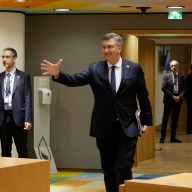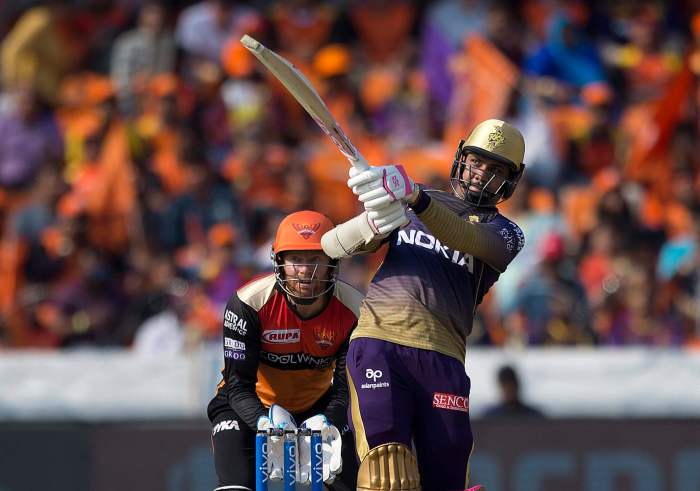 In “The Identical,” Seth Green plays the best friend of a man whose twin is an Elvis-esque musician.
In “The Identical,” Seth Green plays the best friend of a man whose twin is an Elvis-esque musician.
Credit: Getty Images
Since he first started acting as a child, Seth Green has been a diverse performer. He may be mostly known for comedy, like “Robot Chicken,” “Austin Powers” and “Family Guy,” but he also spent three years on “Buffy the Vampire Slayer” (after being cut from the 1992 movie) and regularly does serious voicework in cartoons. “The Identical” seems unusual even for him: It’s a quasi-religious musical drama, in which he plays a drummer and the best friend of a man (Blake Rayne) who’s actually the secret twin of an Elvis-like superstar. But, Green says, it’s good that you wouldn’t expect such a film from him.
You’ve played musicians before. Oz on “Buffy” played guitar. You’re character here is a drummer. Have you drummed before?
Not really. My friend Breckin is a drummer, and when we were teenagers he showed me some basic things that I then continued to quasi-practice, whenever the radio was on. But I never really played the drums. I had a coach and we decided that instead of me learning how to play drums he would teach me how to play these songs. I looked at the songs like choreography. Instead of learning to catch a beat, it was like “left foot, right foot, hand left.” That made it more accomplishable.
Your character doesn’t have a ton of screentime to show your character’s friendship with Ryan, the protagonist.
It’s the stuff you don’t see. These guys are supposed to be best buddies, and I just thought about what that’s like to have a best friend and what that person means to you. I could really think who this guy was, top to bottom — what his every day was like as a guy who spends his whole life playing drums. We shot in Nashville, where there’s music everywhere, all the time. We saw a bunch of shows. I saw this one woman perform. Her drummer was just this dude — had to be in his mid-to-late 60s, white hair, big white beard, just sitting behind the drums, happy as can be. He was doing complicated stuff, but effortlessly. He didn’t even move his shoulders. He had such a great connection with the singer. I just watched their relationship. You could see he clearly loved this singer. And that’s what my character was. He really appreciates the gift [Ryan] has and he just wants to back that up and make that come out.
Was music what really drew you to this film, or was there something else?
This story uses Elvis so it can create an allegory about nature vs. nurture. Blake spends the entire movie feeling like there’s something missing in his life and he can’t explain why. And then he finds he has a twin, and not only that, that he loves music and feels inclined to sing — that he needs to perform and doesn’t feel comfortable unless he’s doing his thing. This is a relatable story, growing up and feeling like your life is not yours. It’s such a magical thing when you’re able to chase the thing that defines you — when you do what you’re supposed to be doing here. For me that’s acting.
This is definitely one of the nicer films you’ve done.
[Laughs] I do a lot of comedy stuff, and comedy by present cultural definition is somewhat cynical, especially in the last 20 years. All of the kids who grew up with the incredibly sincere messages of the ’80s have spit them back out as post-ironic self-awareness. Then that has informed the younger generation, who have grown up almost without empathy. [Laughs] Just a very entitled, digital generation who don’t know how to interact with each other in real life. It’s a strange time. So I like being a part of positive things. This movie is so sweet and heartfelt and all the opportunities it has to be trite it’s just sincere.
 Seth Green gets to play the drums in “The Identical.”
Seth Green gets to play the drums in “The Identical.”
Credit: Freestyle Releasing
This is definitely an at least quasi-religious film. You’ve been known to sound off about religion.
I’m not critical of religion, because I really believe that being alive, being human is very difficult. Whatever gets you there — whatever philosophy or theology, whatever structure gets you there — use it. My personal thing, and I say the same thing about acting, is that what I use works for me, but I wouldn’t dare project it onto others — the same way I wouldn’t want someone to project their beliefs onto me. This movie does something very subtle, which is it doesn’t say one side is right or wrong. The father is a preacher and you can see his point of view, and you can see where does good in his life and is a good man. Even though he’s trying to make his son be a preacher, the film doesn’t say preaching it’s bad. It’s just saying their paths aren’t the same.
Have to ask: When you were a teenager you became really famous for a catchphrase in a commercial for the fast found joint Rally’s, where you just said “Cha-Ching.” For a brief period, you were basically Bart in the “I Didn’t Do It” Boy episode of “The Simpsons.” What was that like?
It was one of the craziest things I’ve ever experienced. You have to understand, I had already been acting for 13, 14 years before I got that job. I’ve done hundreds of commercials. This was no different. The fact that it became a popular catchphrase was so surreal. What I noticed was the way our culture defined “celebrity.” There was this sensation created around this catchphrase that had nothing to do with me as a person or as a performer. People didn’t even know my name. People weren’t like, “Oh, it’s Seth Green saying ‘Cha-Ching.’” They said, “Oh my gosh, it’s the ‘Cha-Ching’ guy.” So I got to do really weird things in the disguise of the “Cha-Ching” guy, because nobody knew it was me.
The company in flew me to New Orleans to cheer the halftime at a Saints-Raiders game. I stepped off the plane like Luke Perry in the second year of “90210.” People were losing their minds. It’s like we were speaking a language and the language was “Cha-Ching.” I was 17 so I was still getting into a fair amount of trouble. I was still getting thrown over the hood of cars by police on occasion. [Laughs] Now I had two to six armed New Orleans police officers escorting me everywhere. They were giving me their cards and saying, “My wife wants to cook the ‘Cha-Ching’ guy a home-cooked meal.” I was like, “Man, under other circumstances you would be reading me my rights.” It gave me a completely different perspective on police too.
Did it at all help you get roles?
No. [Laughs] It existed as a completely separate event. It was totally isolated from my career. When I went to New Orleans, I had already been cast as a regular on an ABC show. We were in production and on the air, and no one connected the “Cha-Ching” guy to that show. People even said to me while I was in New Orleans, “Hey, are you going to continue acting?” I was like, “I’ve already starred in a movie directed by Woody Allen [‘Radio Days,’ in which he played the child version of Allen]! This is what I’m doing with my life!” But it gave me a great perspective on celebrity, because it was all context. No one was excited about me. No one thought I personally was hot s— or a big deal. They were excited about the fever of the “Cha-Ching” sensation. I was just a mouthpiece. [Laughs] It really could have been anybody. It made me take the whole notion of celebrity a little less seriously.
Follow Matt Prigge on Twitter @mattprigge















